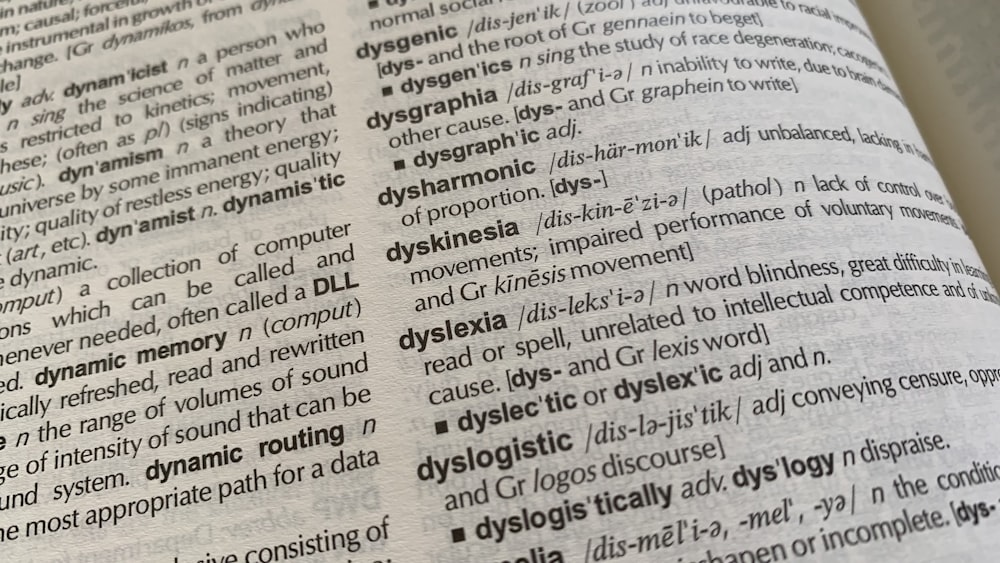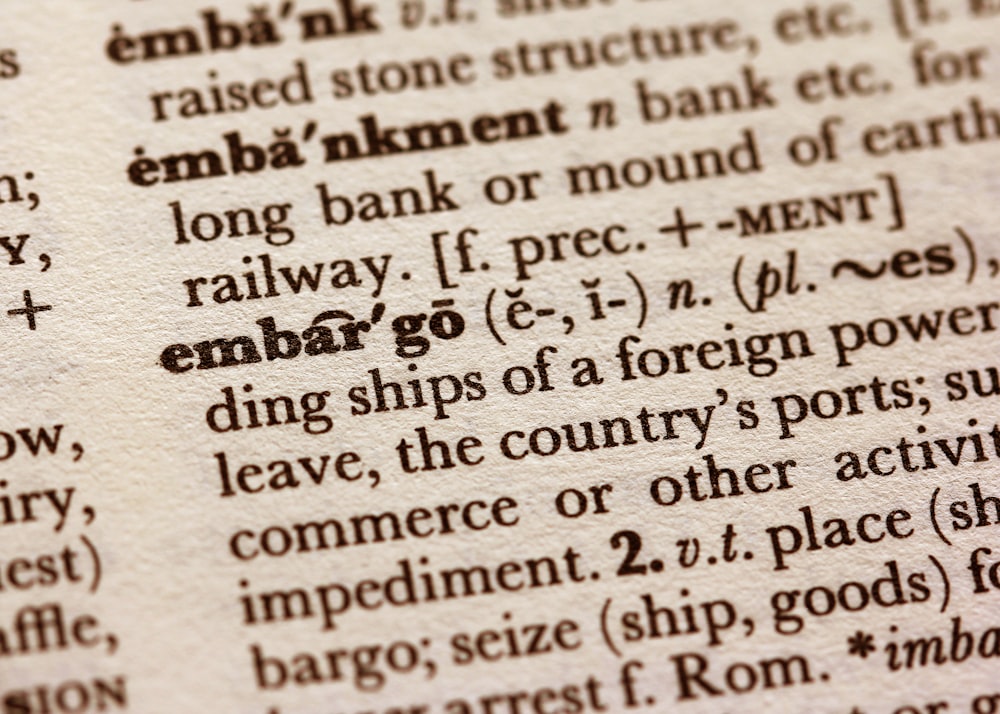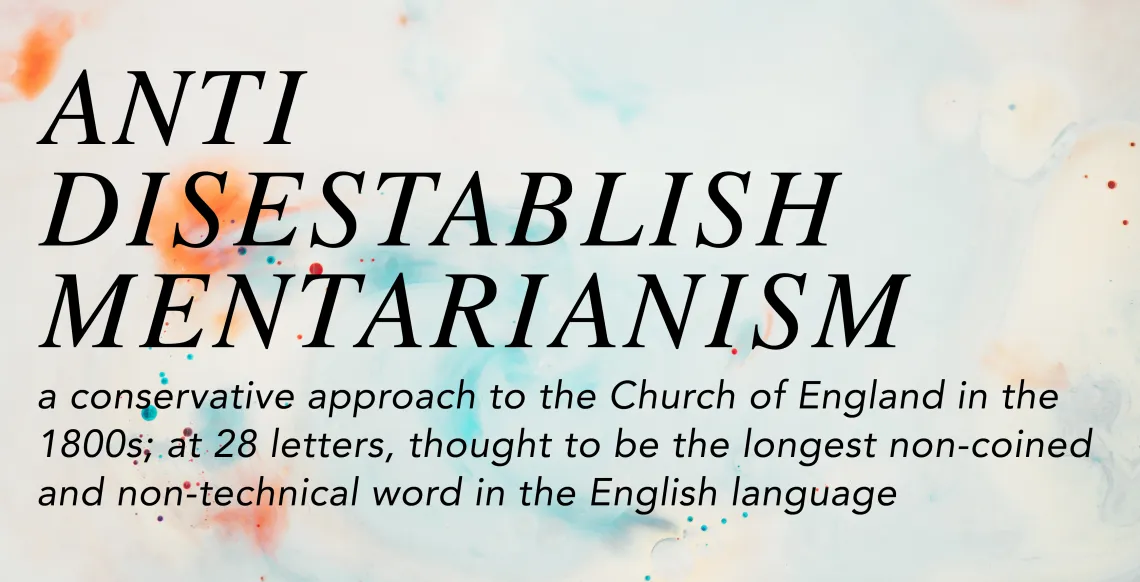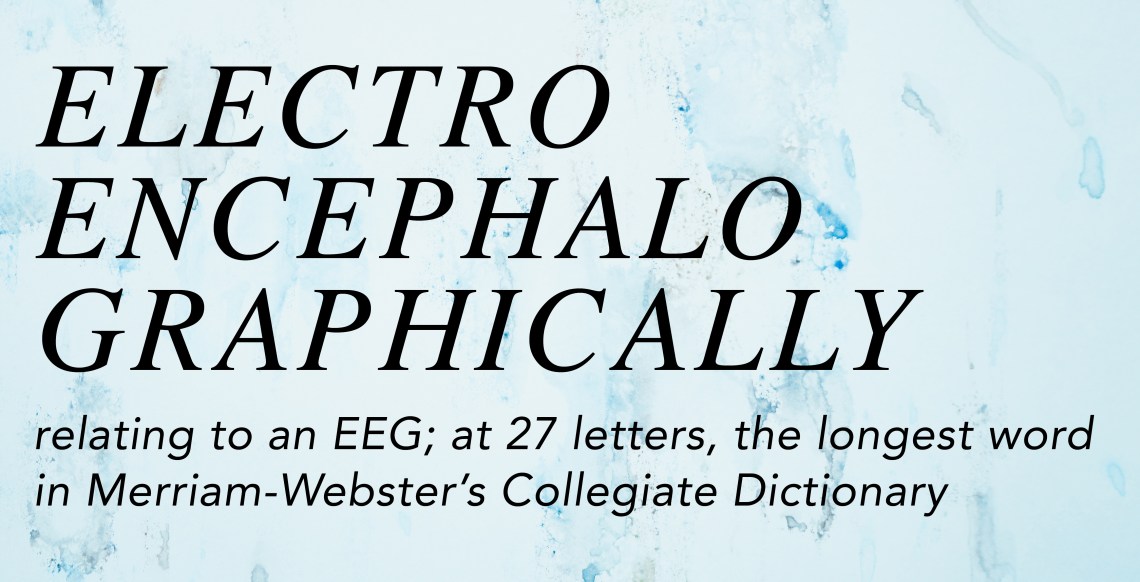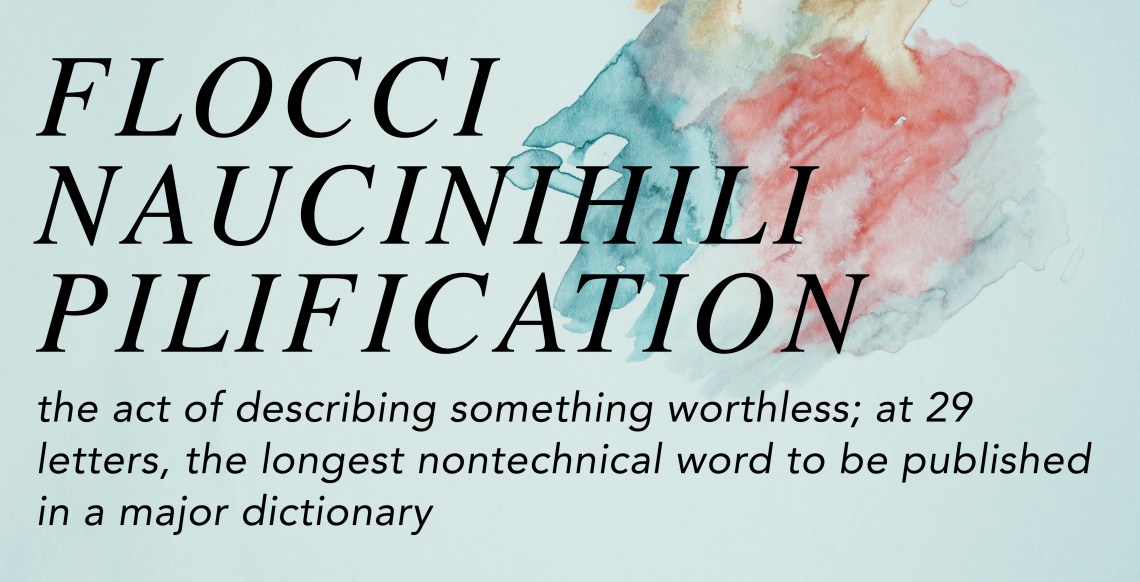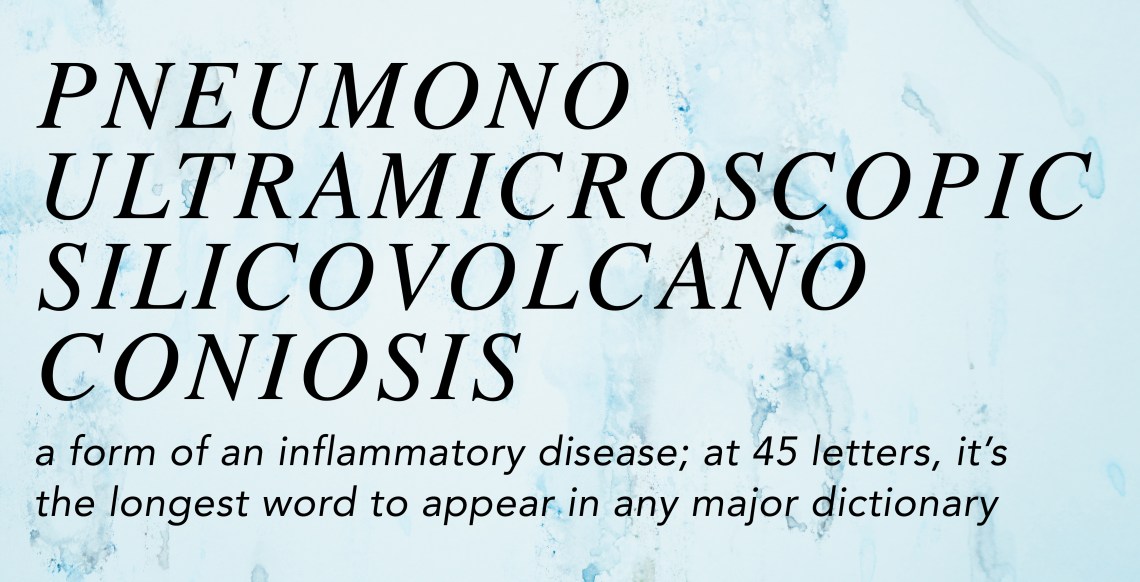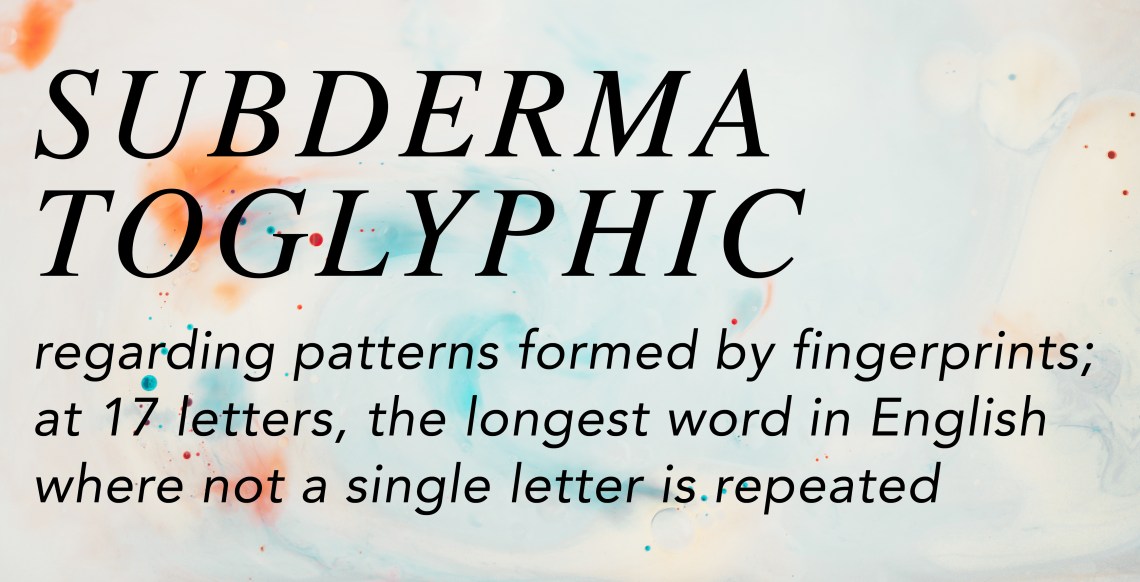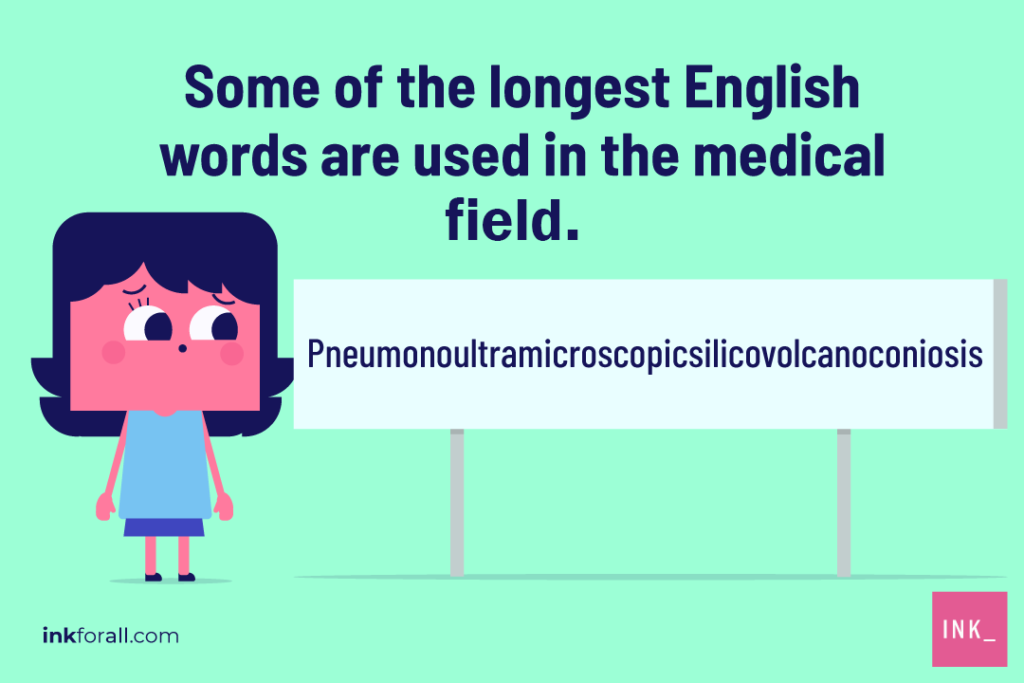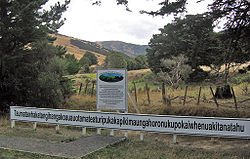The biggest word in the English language is 189,819 letters long, and takes three hours to pronounce! More commonly used big words are several syllables long, and often make people feel smart when they say them out loud. Somewhat ironically, however, study after study has shown that using big words usually makes people sound dumb.
There is a time and a place for big words. If you’re a writer, you might want to be careful about how often you invoke long words that no one has ever heard of before. Mark Twain has a few good quotes about why writers should be economical and precise:
“Don’t use a five-dollar word when a fifty-cent word will do.”
“The difference between the almost right word and the right word is really a large matter – it’s the difference between the lightning bug and the lightning.”
With that said, below is a list of some of the biggest words in the English language, which you can choose to ignore, or insert into your writing and vocabulary. Remember, sometimes, a big word works better. Try to insert a new word into your vocabulary every day until you’re able to use them naturally, without thinking about it. Here are some big words that you can use to sound smart around your family and friends, along with their meaning so you use them in the correct way:
1. Abstentious
Self-restraining; also the longest word in the English language to use all five vowels in order once
2. Accoutrements
trappings, esp. related to apparel
3. Acumen — ability, skill
4. Anachronistic — a story that didn’t actually happen
5. Anagnorisis — the moment in a story when the main character realizes something that leads to a resolution
6. Anomalist — difficult to classify
8. Apropos — appropriate
9. Arid — dry
10. Assiduous — painstaking; taking great care through hard work
11. Auspicious — signaling a positive future
Big Words (B-C)
12. Behoove — something that is a personal duty
13. Bellwether — the first sheep in a flock, wearing a bell around its neck
14. Callipygian — having large, round, succulent buttocks
15. Circumlocution —the act of using too many words
16. Consanguineous — of the same blood or same ancestor
17. Conviviality — friendliness
18. Coruscant — sparkling
19. Cuddlesome — cuddly
20. Cupidity — greed
21. Cwtch — from the Welsh word for “hiding place”; the longest word in English to be entirely composed of consonants
22. Cynosure — center of attention
Big Words (D)
23. Deleterious — harmful
24. Desideratum — something needed or wanted
Big Words (E)
26. Enervating — exhausting
27. Equanimity — level-headedness
28. Euouae — a medieval musical term; the longest word in a major dictionary entirely composed of vowels
29. Excogitate — to plan
Big Words (F)
31. Florid — red and inflamed
32. Fortuitous — lucky
33. Frugal — cheap, thrifty
Big Words (G-M)
34. Gasconading — bragging
35. Grandiloquent — verbally pompous
36. Hackneyed — clichéd
37. Honorificabilitudinitatibus — an extremely long-winded way to say “honorable”; at 27 letters, the longest word in the work of William Shakespeare; also the longest word in the English language featuring alternating consonants and vowels
38. Idiosyncratic — peculiar
39. Indubitably — without a doubt
40. Ivoriate — to cover in ivory
41. Lopadotemachoselachogaleokranioleipsanodrimhypo…pterygon — (ellipsis used because the word is 182 letters long) an elaborate fricassee; coined word that appeared in the play Assemblywomen by Aristophanes
42. Methionylthreonylthreonylglutaminylalanyl…isoleucine … the chemical name for titin, the largest known protein; ellipsis used because at 189,819 letters, it’s the largest known word and takes over three hours to pronounce
43. Milieu — environment
Big Words (N-P)
44. Nidificate — to build a nest
45. Nonchalant — carefree and unbothered
46. Osculator — one who loves or is loved
47. Paradigm — model
48. Parastratiosphecomyiastratiosphecomyiodes — a species of fly native to Thailand
49. Parsimonious — cheap
50. Penultimate — second to last
51. Perfidious — treacherous
52. Perspicacious — perceptive
54. Proficuous — profitable
55. Predilection — preference
56. Pseudopseudohypoparathyroidism — an inherited thyroid disorder
57. Psychotomimetic – inducing psychotic alteration of behavior and personality
Big Words (Q-Z)
58. Querulous — fussy
59 Rancorous — bitter and argumentative
60. Remunerative — lucrative
61. Rotavator — a soil tiller; at 9 letters, the longest palindromic word in the English language (i.e., it’s spelled the same way backwards)
62. Saxicolous — something that lives on rocks
63. Sesquipedalian — involving long words, just like this article
64. Splendiferous — wonderful
65. Squirrelled — put away; the longest one-syllable word in the English language
67. Supercilious — when a person is arrogant
68. Synergy — extra energy generated by cooperation
69. Unencumbered — free
70. Unparagoned — without equal
71. Winebibber — an alcoholic 
By
Last updated:
March 10, 2023
The longest word in the English language is “pneumonoultramicroscopicsilicovolcanoconiosis.”
Try saying that quickly five times!
In this post we’ll explore some of the longest words in English, plus teach you how to break them down so that you can pronounce them easily.
Contents
- Longest Word in English: Pneumonoultramicroscopicsilicovolcanoconiosis
- More Long Words in English
-
- Methionylthreonylthreonylglutaminylalanyl…isoleucine
- Floccinaucinihilipilification
- Incomprehensibility
- Surreptitious
- Uncharacteristically
- Supercalifragilisticexpialidocious
- Subdermatoglyphic
- Abstentious
- Uncopyrightable
- Hippopotomonstrosesquipedaliophobia
- Antidisestablishmentarianism
- Honorificabilitudinitatibus
- Pseudopseudohypoparathyroidism
- Longest Adjectives in English
- Longest Suffixes in English
- Longest Prefixes in English
- Longest Verbs in English
- How to Learn the Longest Words in English
Download:
This blog post is available as a convenient and portable PDF that you
can take anywhere.
Click here to get a copy. (Download)
Longest Word in English: Pneumonoultramicroscopicsilicovolcanoconiosis
Letters: 45
Definition (noun): Lung disease caused by breathing in dust or volcanic ash
The patient is experiencing signs of pneumonoultramicroscopicsilicovolcanoconiosis after hiking near the site of a volcanic eruption.
This is the longest word that exists in the English language. As with other long words, you should be patient and break it down into its individual components.
As you can see below, knowing the parts of this word will be especially helpful for anyone studying English in an academic, scientific or medical environment.
Essential word parts: Pneumo- (lung), microscopic- (small), coni- (particles) and a suffix: -osis (often indicates a disease).
More Long Words in English
We will show you the essential parts of these long words that can help you learn the word itself and other English words. We will specifically note common English prefixes and suffixes to pay attention to.
Methionylthreonylthreonylglutaminylalanyl…isoleucine
Letters: 189,819
Definition (noun): Chemical composition of “titin,” which is the largest known protein in the body
This word has taken some people around 2-3.5 hours to pronounce! Amazing, isn’t it? It’s not, however, considered the longest word in English—because it’s not in a dictionary.
Essential word parts: Amino acid residues that make up the protein. These include methionine, threonine, glutamine, alanine, and isoleucine.
Floccinaucinihilipilification
Letters: 29
Definition (noun): Deciding that something has no value
Since my wallet was becoming so huge, I took a few minutes for some floccinaucinihilipilification of all the old cards I was keeping in there.
This is one of those complex words that seems made up. It was formed from various Latin words and can still be confusing to understand after breaking it down.
Essential word part: Nihili- (nothing)
Incomprehensibility
Letters: 19
Definition (noun): Impossible to understand
The incomprehensibility of the word made people question its meaning.
This word has common prefixes and suffixes that you will see in many other English words. Plus, you may already be familiar with more basic forms of this word, such as incomprehensible (adjective — impossible to understand)
Essential word parts: include a prefix in- (not), a root word prehend (from the Latin for “grasp”), and a suffix: –ity (suffix used to form a noun out of an adjective).
Surreptitious
Letters: 13
Definition (adjective): Secret, stealthy
The robbers were surreptitious as they stole the jewels.
This word is used fairly regularly among native English speakers. It is one of the less complex long English words.
Essential word part: Prefix: sur- (under, below)
Uncharacteristically
Letters: 20
Definition (adverb): Not typical
The star basketball player uncharacteristically missed the game-winning shot.
Here is another fairly standard word that helps you practice both a common prefix and suffix.
Essential word parts: Prefix: un- (not) and a suffix: -ly (used to form an adjective)
Supercalifragilisticexpialidocious
Letters: 34
Definition (adjective): Especially wonderful
The sun is shining and all is right in the world. It is a supercalifragilisticexpialidocious day.
This is a made-up word that native English speakers recognize from the classic 1964 “Mary Poppins” movie (although a version of this word was invented even earlier).
Essential word parts: Cali- (beauty).
Subdermatoglyphic
Letters: 17
Definition (adjective): Pertaining to the layer of the skin beneath the fingertips
The subdermatoglyphic state of everyone’s fingerprints are different.
This word is extremely rare, and may be more interesting to linguists than to medical professionals. That is because it is a very long isogram, or a word that does not repeat any letters.
Essential word parts: Prefix: sub- (under, below — similar to “sur-“), derma- (skin) and a suffix: -ic (used to form an adjective).
Abstentious
Letters: 11
Definition (adjective): Self-restraining
You never have trouble sticking to your diet. You are so abstentious!
You will more commonly hear abstain, the verb form of this word. Abstain means to avoid or restrain yourself from something, like alcohol, online-shopping, food, etc.
Essential word parts: Suffix: -ious (used to form an adjective).
Uncopyrightable
Letters: 15
Definition (adjective): Not able to copyright a piece of artwork. If something is uncopyrightable, one person cannot prevent others from copying or distributing the art.
The idea was not original, so it was unfortunately uncopyrightable.
Un- and -able are common word parts. Try to memorize these and look for them in other English words.
Essential word parts: Prefix: un- (not) and a suffix: -able (ability).
Hippopotomonstrosesquipedaliophobia
Letters: 35
Definition (noun): Fear of long words
As she read this article, she realized that she had a severe case of hippopotomonstrosesquipedaliophobia.
This may be how you are feeling right now.
Essential word parts: Suffix: -phobia (fear).
Antidisestablishmentarianism
Letters: 28
Definition (noun): A political philosophy opposed to the disestablishment of the Church of England.
The word was used to describe a political movement in England in the 1800s. People supporting this movement were against a plan to separate the church from the state.
There were many supporters of antidisestablishmentarianism in Wales.
Essential word parts: Prefix: anti- (against) and dis- (opposite of), suffix: -arian (engaged in), and -ism (a belief in).
Honorificabilitudinitatibus
Letters: 27
Definition (noun): State of being able to achieve honors.
Dumbledore was well-known for lots of things, including being honorificabilitudinitatibus.
This rare Latin word features in William Shakespeare’s play “Love’s Labour’s Lost.”
Essential word parts: A root word honorificabilitudin (the state of being honorable) and suffix: –itatibus (a state of being).
Pseudopseudohypoparathyroidism
Letters: 28
Definition (noun): A rare inherited endocrine disorder that causes abnormal growth of bones.
She was diagnosed with pseudopseudohypoparathyroidism.
Essential word parts: Pseudo-(prefix) meaning false, hypo-(prefix) meaning below. Parathyroid- (root word) small glands in our body which regulate calcium, and -ism (suffix) meaning “a belief in.”
Longest Adjectives in English
- Unconventionally — something or someone is not following accepted standards or conventions (14 letters)
- Uncontrollably — in a way that is too strong to be restrained or controlled (13 letters)
- Unforgettably — in a manner that you cannot forget it (13 letters)
- Unimaginably — in a way that’s difficult to imagine (12 letters)
- Unmistakably — in a way that cannot be mistaken for something else (12 letters)
- Unquestionably — in a way that cannot be doubted (13 letters)
- Unreasonably — meaning that something is unfair or not based on good sense (12 letters)
- Unstoppably — in a way that is unable to be stopped (11 letters)
- Unthinkably — it means that something cannot be accepted as a possibility (11 letters)
Longest Suffixes in English
- –-ization — it creates a noun that denotes the act, process or result of an action (9 letters)
- –-iveness — it shows a quality or tendency (9 letters)
- –-fullness — it creates a noun that denotes the quality of being full or complete (9 letters)
Longest Prefixes in English
- Inter- — meaning between, among (5 letters)
- Trans- — meaning across or beyond (5 letters)
- Hyper- — means excessively, beyond normal (5 letters)
- Super- — meaning above, beyond (5 letters)
- Ultra- — meaning extremely, beyond normal (5 letters)
- Mega- — means very large, huge (5 letters)
Longest Verbs in English
- Counterdemonstrate — to demonstrate in opposition to another demonstration (14 letters)
- Decontaminate — to remove dangerous substances from something (12 letters)
- Disenfranchise — to deprive someone of a right or privilege, especially of the right to vote (12 letters)
- Disseminate — to spread widely or to scatter (11 letters)
- Encapsulate — to enclose something in a capsule (11 letters)
- Excommunicate — to expel from a church or other religious organization (12 letters)
- Extrapolate — to infer from known facts or data (11 letters)
- Hypothesize — to form a hypothesis or conjecture (11 letters)
- Interrogate — to question formally or search thoroughly (11 letters)
- Reincorporate — to incorporate again or anew (13 letters)
How to Learn the Longest Words in English
Firstly: Break each word down into manageable parts
While long English words can seem complex, breaking them down into parts will make learning them easier!
Each of the words we discuss in this article, we will show you the important elements including prefixes, suffixes and roots. Let’s define the parts of a word and what they represent.
- Root word: the base form of a word
- Prefix: an element attached to the beginning of a root word that alters its meaning
- Suffix: an element attached to the end of a root word that alters its meaning
Secondly: Use vocabulary memory tricks
-
Put the words and word parts onto flashcards.
Flashcards are a perfect way to study and memorize long words. The language learning program FluentU allows you to make your own multimedia flashcards which are connected to a curated library of authentic videos—including news reports, inspiring talks and music videos. - Keep a running list. Track word components in a notebook. Any time you encounter a new prefix, suffix or root word, write it down in your list. This will help you keep track of the word parts you learn. You can refer to this list as you try to learn other long and complex words.
But most importantly, try to have fun with these words. Be patient and you will start pronouncing them in no time!
Download:
This blog post is available as a convenient and portable PDF that you
can take anywhere.
Click here to get a copy. (Download)
We’ve all been there: trying to pronounce chemical names on the back of a shampoo bottle. No surprise one of the longest words in English is the chemical name for the human titin protein.
One of the longest Englishwords has over 180,000 letters. Spelling it would take 57 pages, so we won’t drag it out here. With that said, there are plenty of other big words in the English language. So, we’ve listed some of them using much smaller words in this article.
Main Longest Words in English Takeaways:
- The average English word has 4.5 letters.
- Many of the longest words in English are scientific or medical terms.
- Pneumonoultramicroscopicsilicovolcanoconiosis has 45 letters.
- Pseudopseudohypoparathyroidism has 30 letters.
- Prefixes and compounds can increase word length.
In this article, we’ve compiled some of the longest words for anyone who appreciates the English language. So, prepare yourself because your vocabulary is about to get much bigger—pun intended.
How Long is the Average Word?
Before we discuss big words, let’s start with some basics. The average English word contains 4.5 letters. The longest words in English dictionaries have significantly more letters than that.
Nearly 60% of English words have at least one ‘e’ in them. ‘T’ comes in second, as it appears in 47.3% of words. Meanwhile, ‘Z’ finds a home in just 0.3% of words, with ‘q’ not far behind at 0.5%.
Why are Some Words So Long?
We often see a word with lots of letters and wonder what happened. Why would anyone create such a long word? Technically, some word formation rules result in big words. For instance, Long words often contain multiple prefixes or compound terms.
“Great” is a prefix that can significantly alter the length of a word. Genetics aside, you can use “great” as many times as you want for family titles. Make sure to use hyphens in between the “great” prefixes, and not commas.
Compound words can also get long. This is especially true when writers hyphenate adjectives. These words can easily become three- or four-word compounds.
Three-Word Hyphenated Compounds
- Do-it-yourself
- Salt-and-pepper
- Remote-robot-assisted
- New-and-improved
Four-Word Hyphenated Compounds
- Run-of-the-mill
- State-of-the-art
- Too-big-to-fail
- Chocolate-chip-milkshake-loving
You may have seen even longer compounds than these. For example, perhaps you viewed a blink-and-you-missed-it theatrical run.
What’s the Longest English Word?
The longest word in the English language has 189,819 letters. We’d love to share it, but it’s 57 pages long, which means a lot of scrolling! So, the word we’re talking about here refers to a chemical compound called titin. For the uninitiated, titin is a human protein found in our vertebral muscle.
Titin’s official term is 189,819 words because it follows traditional protein-naming guidelines. Proteins’ names are typically derived from their contributing chemicals. Titin has a lengthy chemical list.
Fun fact:It would take 3.5 hours to say the official name for titin out loud.
Some lexicographers consider titin a verbal formula rather than an official word. Lexicographers are the language experts who help create dictionaries. Traditional dictionaries don’t have room for lengthy words such as the scientific term for titin.
What are Some of the Longest Words in English?
Many big words are scientific or medical terms. Normally, scientists combine several ingredients and traits to form these scientific terms. Meanwhile, medical terms often contain prefixes and suffixes.
Most of us don’t have hours to pronounce the scientific term for titin. However, you can impress your friends with these long words:
1. lopadotemachoselachogaleokranioleipsanodrimhypotrimmatosilphioparaomelitokatakechymenokichlepikossyphophattoperisteralektryonoptekephalliokigklopeleiolagoiosiraiobaphetraganopterygon (182 letters) – a fictional meal referenced in Assemblywomen, a comedy by Aristophanes.
2. pneumonoultramicroscopicsilicovolcanoconiosis (45 letters) – a synonym for silicosis. Silicosis is a lung disease caused by inhaling silica. It’s also the longest word that you’ll find in most well-known dictionaries.
3. supercalifragilisticexpialidocious (34 letters) – a nonsense word featured in Mary Poppins. Admit it: You sang this word rather than read it.
4. pseudopseudohypoparathyroidism (30 letters) – a genetic medical condition similar to pseudohypoparathyroidism.
5. floccinaucinihilipilification (29 letters) – the act of finding something worthless or without value. Finally, a nontechnical word on our list!
6. antidisestablishmentarianism (28 letters) – a political stance that opposes disestablishment. While many people assume antidisestablishmentarianism is the longest word in the English language, it’s not. In fact, it has 12 syllables only.
7. honorificabilitudinitatibus (27 letters) – with honorableness. This is an interesting word because it alternates consonants and vowels.
Why are Scientific Words So Long?
Maybe you have noticed that many of the longest words to date are scientific words. Why is that so? It’s because the scientific naming convention orbinomial nomenclature followed by the scientific community is derived from Latin. Latin words tend to have more vowels and, therefore, more letters. This naming convention is standardized. Meaning, every creature or organism will only have one scientific name, regardless of where they are in the world. Here are some examples:
1.Parastratiosphecomyia stratiosphecomyioides (42 letters) — a species of soldier fly native to Thailand.
2. Griseotyrannus aurantioatrocristatus (36 letters) — a species of bird. It is native to South-Central and South-Eastern Amazonia. It is known as the crown slaty flycatcher.
3. Anaerobiospirillum succiniciproducens (37 letters) — a genus of spiral-shaped bacteria.
4. Gammaracanthuskytodermogammarus loricatobaicalensis (51 letters) — the longest proposed name for an organism — a tiny amphipod from Lake Baikal, the world’s deepest lake, in Russia.
In Short…
Ridiculously long words can make for interesting trivia, but, let’s face it, few will benefit from adding these monstrosities to their vocabulary. But if you’re looking for a lengthy word that could net you a world record, try oxyphenbutazone. It’s believed to be the highest-scoring word that can be played in a game of Scrabble (1,458 points on an outside edge).
Quick Longest Words in English Grammar Quiz
Longest Words in English Question #1
Correct!
Wrong!
The answer is TRUE. Nearly 60 percent of English words have at least one “e” in them.
Longest Words in English Question #2
A. Words are longer in the English language because of the prefix.
B. An average word in English has 7.5 letters.
C. Long words usually contain compound terms.
D. The longest word in the English language has 189,819 letters.
Correct!
Wrong!
The answer is B. An average English word has 4.5 letters.
Longest Words in English Question #3
Correct!
Wrong!
The answer is False. “Z” is the least common letter, present in 0.3 percent of English words. On the other hand, “q” is present in 0.5 percent of English words.
Longest Words in English Question #4
Correct!
Wrong!
The answer is B. This plural form of incomprehensibility describes things or events that are difficult to understand.
Read More: Hyphen vs. Dash: Size Matters in Punctuation
Do you want to impress your friends with the longest English words? This blog is for you! Some of these words aren’t used very often, but some of them are quite common and you will absolutely be able to use them whenever you’re speaking English.
- The longest word in English
- The longest word in the dictionary
- The longest words we actually use
- The longest word with one syllable
- The longest word with one vowel
Learn languages at your pace
The longest word in English
The actual longest word in English is unfortunately so long that I can’t write it here. It has 189,819 letters and takes over three hours to say! We don’t have time for that. And thankfully, it isn’t a word you’re likely to use because it’s the chemical name for titin. Here’s a very brief snapshot: meth…ucine. Just add 189,810 letters in between.
The longest word in the dictionary
Pneumonoultramicroscopicsilicovolcanoconiosis is the longest word in any major English dictionary. It refers to a lung disease which can also be called silicosis. Why the long version then? Because it was deliberately made up to be the longest word in the English dictionary. The longest non-technical, non-medical word in an English dictionary is the 29-letter floccinaucinihilipilification. This is a Latin word that means the act of estimating that something is worthless.
The longest words we actually use
You might have realized you’ve never heard anyone use any of the words we’ve mentioned so far. That has nothing to do with your level of English – most native speakers don’t know those words either! The longest words you will see in a normal English text are counterrevolutionaries and deinstitutionalisation, both with 22 letters. Another, with 21 letters, is incomprehensibilities, meaning things which are impossible to understand. The longest word we use regularly in everyday speech is probably uncharacteristically, at 20 letters.
Learn languages at your pace
The longest word with one syllable
Brits and Americans are going to argue over this one. Because of our different pronunciations, we don’t agree on what is the longest one-syllable word in English. People from the US and Canada might tell you that it’s the word squirrel(l)ed. This has ten or eleven letters, again depending on where you’re from. While our transatlantic friends pronounce this something like ‘squirld’ (ˈskwərld), Brits pronounce the word squirrelled with two syllables: ‘squir-relled’ (ˈskwir-əld). I don’t want to say who’s wrong or right but… we are learning British English here.
There are several longest words with one syllable in British English and they all have nine letters: screeched, scratched and strengths are just three of them. (We’re going to see strengths again in a bit – it’s our word of the day today.)
The longest word with only vowels
Euouae wins this category. With six letters, it is the longest word in English with only vowels. However, ask an English person what this word means and they probably won’t have a clue. It’s a musical word from medieval times, so not a massively useful term to know for most of us.
The longest word without a vowel
People argue over this one because it’s hard to agree on what is or isn’t a vowel. If we take the standard English definition that there are five vowels – a e i o u – then rhythms is the longest English word without a vowel. But some people will say that the y in rhythm acts as a vowel.
Another worthy contender for this category is the word tsktsks. That doesn’t look much like English, does it? It’s more of a sound than a word and it’s sometimes spelt tsk-tsks, but tsktsks is allowed in Scrabble so I think it counts. It’s similar to a tut-tut sound of disapproval.
The longest word with one vowel
Strengths! Our word of the day is back. Strengths, with nine letters, is the longest word in English with only one vowel. A fairly close rival is schnapps, which has eight letters; so let’s raise a glass to it, and to all of the long words we’ve met today, and say ‘cheers’.
Which of these long words do you think you’ll be able to use in your next English conversation?
Learn languages at your pace
Laura is a freelance writer and was an ESL teacher for eight years. She was born in the UK and has lived in Australia and Poland, where she writes blogs for Lingoda about everything from grammar to dating English speakers. She’s definitely better at the first one. She loves travelling and that’s the other major topic that she writes on. Laura likes pilates and cycling, but when she’s feeling lazy she can be found curled up watching Netflix. She’s currently learning Polish, and her battle with that mystifying language has given her huge empathy for anyone struggling to learn English. Find out more about her work in her portfolio.
From Wikipedia, the free encyclopedia
The identity of the longest word in English depends on the definition of a word and of length.
Words may be derived naturally from the language’s roots or formed by coinage and construction. Additionally, comparisons are complicated because place names may be considered words, technical terms may be arbitrarily long, and the addition of suffixes and prefixes may extend the length of words to create grammatically correct but unused or novel words.
The length of a word may also be understood in multiple ways. Most commonly, length is based on orthography (conventional spelling rules) and counting the number of written letters. Alternate, but less common, approaches include phonology (the spoken language) and the number of phonemes (sounds).
| Word | Letters | Meaning | Claim | Dispute |
|---|---|---|---|---|
| methionylthreonylthreonylglutaminylalanyl…isoleucine | 189,819 | The chemical composition of titin, the largest known protein | Longest known word overall by magnitudes. Attempts to say the entire word have taken two[1] to three and a half hours.[2] | Technical; not in dictionary; whether this should actually be considered a word is disputed |
| methionylglutaminylarginyltyrosylglutamyl…serine | 1,909 | The chemical name of E. coli TrpA (P0A877) | Longest published word[3] | Technical |
| lopadotemachoselachogaleokranioleipsano…pterygon | 183 | A fictional dish of food | Longest word coined by a major author,[4] the longest word ever to appear in literature[5] | Contrived nonce word; not in dictionary; Ancient Greek transliteration |
| pneumonoultramicroscopicsilicovolcanoconiosis | 45 | The disease silicosis | Longest word in a major dictionary[6] | Contrived coinage to make it the longest word; technical, but only mentioned and never actually used in communication |
| supercalifragilisticexpialidocious | 34 | Unclear in source work, has been cited as a nonsense word | Made popular in the Mary Poppins film and musical[7] | Contrived coinage |
| pseudopseudohypoparathyroidism | 30 | A hereditary medical disorder | Longest non-contrived word in a major dictionary[8] | Technical |
| antidisestablishmentarianism | 28 | The political position of opposing disestablishment | Longest non-contrived and nontechnical word[9] | Not all dictionaries accept it due to lack of usage.[10] |
| honorificabilitudinitatibus | 27 | The state of being able to achieve honors | Longest word in Shakespeare’s works; longest word in the English language featuring alternating consonants and vowels[11] | Latin |
Major dictionaries
The longest word in any of the major English language dictionaries is pneumonoultramicroscopicsilicovolcanoconiosis (45 letters), a word that refers to a lung disease contracted from the inhalation of very fine silica particles,[12] specifically from a volcano; medically, it is the same as silicosis. The word was deliberately coined to be the longest word in English, and has since been used[citation needed] in a close approximation of its originally intended meaning, lending at least some degree of validity to its claim.[6]
The Oxford English Dictionary contains pseudopseudohypoparathyroidism (30 letters).
Merriam-Webster’s Collegiate Dictionary does not contain antidisestablishmentarianism (28 letters), as the editors found no widespread, sustained usage of the word in its original meaning. The longest word in that dictionary is electroencephalographically (27 letters).[13]
The longest non-technical word in major dictionaries is floccinaucinihilipilification at 29 letters. Consisting of a series of Latin words meaning «nothing» and defined as «the act of estimating something as worthless»; its usage has been recorded as far back as 1741.[14][15][16]
Ross Eckler has noted that most of the longest English words are not likely to occur in general text, meaning non-technical present-day text seen by casual readers, in which the author did not specifically intend to use an unusually long word. According to Eckler, the longest words likely to be encountered in general text are deinstitutionalization and counterrevolutionaries, with 22 letters each.[17]
A computer study of over a million samples of normal English prose found that the longest word one is likely to encounter on an everyday basis is uncharacteristically, at 20 letters.[18]
The word internationalization is abbreviated «i18n», the embedded number representing the number of letters between the first and the last.[19][20][21]
Creations of long words
Coinages
In his play Assemblywomen (Ecclesiazousae), the ancient Greek comedic playwright Aristophanes created a word of 171 letters (183 in the transliteration below), which describes a dish by stringing together its ingredients:
Henry Carey’s farce Chrononhotonthologos (1743) holds the opening line: «Aldiborontiphoscophornio! Where left you Chrononhotonthologos?»
Thomas Love Peacock put these creations into the mouth of the phrenologist Mr. Cranium in his 1816 book Headlong Hall: osteosarchaematosplanchnochondroneuromuelous (44 characters) and osseocarnisanguineoviscericartilaginonervomedullary (51 characters).
James Joyce made up nine 100-letter words plus one 101-letter word in his novel Finnegans Wake, the most famous of which is Bababadalgharaghtakamminarronnkonnbronntonnerronntuonnthunntrovarrhounawnskawntoohoohoordenenthurnuk. Appearing on the first page, it allegedly represents the symbolic thunderclap associated with the fall of Adam and Eve. As it appears nowhere else except in reference to this passage, it is generally not accepted as a real word. Sylvia Plath made mention of it in her semi-autobiographical novel The Bell Jar, when the protagonist was reading Finnegans Wake.
«Supercalifragilisticexpialidocious», the 34-letter title of a song from the movie Mary Poppins, does appear in several dictionaries, but only as a proper noun defined in reference to the song title. The attributed meaning is «a word that you say when you don’t know what to say.» The idea and invention of the word is credited to songwriters Robert and Richard Sherman.
Agglutinative constructions
The English language permits the legitimate extension of existing words to serve new purposes by the addition of prefixes and suffixes. This is sometimes referred to as agglutinative construction. This process can create arbitrarily long words: for example, the prefixes pseudo (false, spurious) and anti (against, opposed to) can be added as many times as desired. More familiarly, the addition of numerous «great»s to a relative, such as «great-great-great-great-grandparent», can produce words of arbitrary length. In musical notation, an 8192nd note may be called a semihemidemisemihemidemisemihemidemisemiquaver.
Antidisestablishmentarianism is the longest common example of a word formed by agglutinative construction.
Technical terms
A number of scientific naming schemes can be used to generate arbitrarily long words.
The IUPAC nomenclature for organic chemical compounds is open-ended, giving rise to the 189,819-letter chemical name Methionylthreonylthreonyl…isoleucine for the protein also known as titin, which is involved in striated muscle formation. In nature, DNA molecules can be much bigger than protein molecules and therefore potentially be referred to with much longer chemical names. For example, the wheat chromosome 3B contains almost 1 billion base pairs,[22] so the sequence of one of its strands, if written out in full like Adenilyladenilylguanilylcystidylthymidyl…, would be about 8 billion letters long. The longest published word, Acetylseryltyrosylseryliso…serine, referring to the coat protein of a certain strain of tobacco mosaic virus (P03575), is 1,185 letters long, and appeared in the American Chemical Society’s Chemical Abstracts Service in 1964 and 1966.[23] In 1965, the Chemical Abstracts Service overhauled its naming system and started discouraging excessively long names. In 2011, a dictionary broke this record with a 1909-letter word describing the trpA protein (P0A877).[3]
John Horton Conway and Landon Curt Noll developed an open-ended system for naming powers of 10, in which one sexmilliaquingentsexagintillion, coming from the Latin name for 6560, is the name for 103(6560+1) = 1019683. Under the long number scale, it would be 106(6560) = 1039360.
Gammaracanthuskytodermogammarus loricatobaicalensis is sometimes cited as the longest binomial name—it is a kind of amphipod. However, this name, proposed by B. Dybowski, was invalidated by the International Code of Zoological Nomenclature in 1929 after being petitioned by Mary J. Rathbun to take up the case.[24]
Myxococcus llanfairpwllgwyngyllgogerychwyrndrobwllllantysiliogogogochensis is the longest accepted binomial name for an organism. It is a bacterium found in soil collected at Llanfairpwllgwyngyll (discussed below). Parastratiosphecomyia stratiosphecomyioides is the longest accepted binomial name for any animal, or any organism visible with the naked eye. It is a species of soldier fly.[25] The genus name Parapropalaehoplophorus (a fossil glyptodont, an extinct family of mammals related to armadillos) is two letters longer, but does not contain a similarly long species name.
Aequeosalinocalcalinoceraceoaluminosocupreovitriolic, at 52 letters, describing the spa waters at Bath, England, is attributed to Dr. Edward Strother (1675–1737).[26] The word is composed of the following elements:
- Aequeo: equal (Latin, aequo[27])
- Salino: containing salt (Latin, salinus)
- Calcalino: calcium (Latin, calx)
- Ceraceo: waxy (Latin, cera)
- Aluminoso: alumina (Latin)
- Cupreo: from «copper»
- Vitriolic: resembling vitriol
Notable long words
Place names
The longest officially recognized place name in an English-speaking country is Taumatawhakatangihangakoauauotamateaturipukakapikimaungahoronukupokaiwhenuakitanatahu (85 letters), which is a hill in New Zealand. The name is in the Māori language. A widely recognized version of the name is Taumatawhakatangihangakoauauotamateaturipukakapikimaungahoronukupokaiwhenuakitanatahu (85 letters), which appears on the signpost at the location (see the photo on this page). In Māori, the digraphs ng and wh are each treated as single letters.
In Canada, the longest place name is Dysart, Dudley, Harcourt, Guilford, Harburn, Bruton, Havelock, Eyre and Clyde, a township in Ontario, at 61 letters or 68 non-space characters.[28]
The 58-letter name Llanfairpwllgwyngyllgogerychwyrndrobwllllantysiliogogogoch is the name of a town on Anglesey, an island of Wales. In terms of the traditional Welsh alphabet, the name is only 51 letters long, as certain digraphs in Welsh are considered as single letters, for instance ll, ng and ch. It is generally agreed, however, that this invented name, adopted in the mid-19th century, was contrived solely to be the longest name of any town in Britain. The official name of the place is Llanfairpwllgwyngyll, commonly abbreviated to Llanfairpwll or Llanfair PG.
The longest non-contrived place name in the United Kingdom which is a single non-hyphenated word is Cottonshopeburnfoot (19 letters) and the longest which is hyphenated is Sutton-under-Whitestonecliffe (29 characters).
The longest place name in the United States (45 letters) is Chargoggagoggmanchauggagoggchaubunagungamaugg, a lake in Webster, Massachusetts. It means «Fishing Place at the Boundaries – Neutral Meeting Grounds» and is sometimes facetiously translated as «you fish your side of the water, I fish my side of the water, nobody fishes the middle». The lake is also known as Webster Lake.[29] The longest hyphenated names in the U.S. are Winchester-on-the-Severn, a town in Maryland, and Washington-on-the-Brazos, a notable place in Texas history. The longest single-word town names in the U.S. are Kleinfeltersville, Pennsylvania and Mooselookmeguntic, Maine.
The longest official geographical name in Australia is Mamungkukumpurangkuntjunya.[30] It has 26 letters and is a Pitjantjatjara word meaning «where the Devil urinates».[31]
Liechtenstein is the longest country name with single name in English. The second longest country name with single name in English is Turkmenistan. There are longer country names if one includes ones with spaces.
Personal names
Guinness World Records formerly contained a category for longest personal name used.
- From about 1975 to 1985, the recordholder was Adolph Blaine Charles David Earl Frederick Gerald Hubert Irvin John Kenneth Lloyd Martin Nero Oliver Paul Quincy Randolph Sherman Thomas Uncas Victor William Xerxes Yancy Zeus Wolfeschlegelsteinhausenbergerdorffvoralternwarengewissenhaftschaferswessenschafewarenwohlgepflegeundsorgfaltigkeitbeschutzenvonangreifendurchihrraubgierigfeindewelchevoralternzwolftausendjahresvorandieerscheinenwanderersteerdemenschderraumschiffgebrauchlichtalsseinursprungvonkraftgestartseinlangefahrthinzwischensternartigraumaufdersuchenachdiesternwelchegehabtbewohnbarplanetenkreisedrehensichundwohinderneurassevonverstandigmenschlichkeitkonntefortplanzenundsicherfreuenanlebenslanglichfreudeundruhemitnichteinfurchtvorangreifenvonandererintelligentgeschopfsvonhinzwischensternartigraum, Senior (746 letters), also known as Wolfe+585, Senior.
- After 1985 Guinness briefly awarded the record to a newborn girl with a longer name. The category was removed shortly afterward.
Long birth names are often coined in protest of naming laws or for other personal reasons.
- The naming law in Sweden was challenged by parents Lasse Diding and Elisabeth Hallin, who proposed the given name «Brfxxccxxmnpcccclllmmnprxvclmnckssqlbb11116» for their child (pronounced [ˈǎlːbɪn], 43 characters), which was rejected by a district court in Halmstad, southern Sweden.
Words with certain characteristics of notable length
- Schmaltzed and strengthed (10 letters) appear to be the longest monosyllabic words recorded in The Oxford English Dictionary, while scraunched and scroonched appear to be the longest monosyllabic words recorded in Webster’s Third New International Dictionary; but squirrelled (11 letters) is the longest if pronounced as one syllable only (as permitted in The Shorter Oxford English Dictionary and Merriam-Webster Online Dictionary at squirrel, and in Longman Pronunciation Dictionary). Schtroumpfed (12 letters) was coined by Umberto Eco, while broughammed (11 letters) was coined by William Harmon after broughamed (10 letters) was coined by George Bernard Shaw.
- Strengths is the longest word in the English language containing only one vowel letter.[32]
- Euouae, a medieval musical term, is the longest English word consisting only of vowels, and the word with the most consecutive vowels. However, the «word» itself is simply a mnemonic consisting of the vowels to be sung in the phrase «seculorum Amen» at the end of the lesser doxology. (Although u was often used interchangeably with v, and the variant «Evovae» is occasionally used, the v in these cases would still be a vowel.)
- The longest words with no repeated letters are dermatoglyphics and uncopyrightable.[33]
- The longest word whose letters are in alphabetical order is the eight-letter Aegilops, a grass genus. However, this is arguably a proper noun. There are several six-letter English words with their letters in alphabetical order, including abhors, almost, begins, biopsy, chimps and chintz.[34] There are few 7-letter words, such as «billowy» and «beefily». The longest words whose letters are in reverse alphabetical order are sponged, wronged and trollied.
- The longest words recorded in OED with each vowel only once, and in order, are abstemiously, affectiously, and tragediously (OED). Fracedinously and gravedinously (constructed from adjectives in OED) have thirteen letters; Gadspreciously, constructed from Gadsprecious (in OED), has fourteen letters. Facetiously is among the few other words directly attested in OED with single occurrences of all six vowels (counting y as a vowel).
- The longest single palindromic word in English is rotavator, another name for a rotary tiller for breaking and aerating soil.
Typed words
- The longest words typable with only the left hand using conventional hand placement on a QWERTY keyboard are tesseradecades, aftercataracts, dereverberated, dereverberates[35] and the more common but sometimes hyphenated sweaterdresses.[34] Using the right hand alone, the longest word that can be typed is johnny-jump-up, or, excluding hyphens, monimolimnion[36] and phyllophyllin.
- The longest English word typable using only the top row of letters has 11 letters: rupturewort. The word teetertotter (used in North American English) is longer at 12 letters, although it is usually spelled with a hyphen.
- The longest using only the middle row is shakalshas (10 letters). Nine-letter words include flagfalls; eight-letter words include galahads and alfalfas.
- Since the bottom row contains no vowels, no standard words can be formed. [37]
- The longest words typable by alternating left and right hands are antiskepticism and leucocytozoans respectively.[34]
- On a Dvorak keyboard, the longest «left-handed» words are epopoeia, jipijapa, peekapoo, and quiaquia.[38] Other such long words are papaya, Kikuyu, opaque, and upkeep.[39] Kikuyu is typed entirely with the index finger, and so the longest one-fingered word on the Dvorak keyboard. There are no vowels on the right-hand side, and so the longest «right-handed» word is crwths.
See also
- Lipogram
- List of long species names
- List of the longest English words with one syllable
- Longest English sentence
- Longest word in French
- Longest word in Romanian
- Longest word in Spanish
- Longest word in Turkish
- Number of words in English
- Scriptio continua
- Sesquipedalianism
- Donaudampfschiffahrtselektrizitätenhauptbetriebswerkbauunterbeamtengesellschaft, longest published word in German
References
- ^ «Reading The Longest English Word (190,000 Characters)». YouTube. Archived from the original on 2021-11-10. Retrieved 2 August 2020.
- ^ «World’s longest word takes 3.5 hours to pronounce». CW39 Houston. 2012-12-08. Retrieved 2020-05-18.
- ^ a b Colista Moore (2011). Student’s Dictionary. p. 524. ISBN 978-1-934669-21-1.
- ^ see separate article Lopado…pterygon
- ^ Donald McFarlan; Norris Dewar McWhirter; David A. Boeh (1989). Guinness book of world records: 1990. Sterling. p. 129. ISBN 978-0-8069-5790-6.
- ^ a b Coined around 1935 to be the longest word; press reports on puzzle league members legitimized it somewhat. First appeared in the MWNID supplement, 1939. Today OED and several others list it, but citations are almost always as «longest word». More detail at pneumonoultramicroscopicsilicovolcanoconiosis.
- ^ «Merriam Webster: Supercalifragilisticexpialidocious».
- ^ «What is the longest English word?». AskOxford. Archived from the original on 2008-10-22. Retrieved 2010-08-22.
- ^ «What is the longest English word?». oxforddictionaries.com.[dead link]
- ^ «Merriam Webster: «Antidisestablishmentarianism is not in the dictionary.»«.
- ^ «Cool, Strange, and Interesting Facts,» fact 99. InnocentEnglish.com. Retrieved 2019-03-13.
- ^ «pneumonoultramicroscopicsilicovolcanoconiosis – definition of pneumonoultramicroscopicsilicovolcanoconiosis in English from the Oxford dictionary». oxforddictionaries.com. Archived from the original on 2012-07-19.
- ^ «The Longest Word in the Dictionary» (Video). Ask the Editor. Merriam-Webster. Archived from the original on 21 November 2013. Retrieved 14 November 2013.
- ^ «Floccinaucinihilipilification» by Michael Quinion World Wide Words Archived 2006-08-21 at the Wayback Machine;
- ^ The Guinness Book of Records, in its 1992 and previous editions, declared the longest real word in the English language to be floccinaucinihilipilification. More recent editions of the book have acknowledged pneumonoultramicroscopicsilicovolcanoconiosis. What is the longest English word? — Oxford Dictionaries Online Archived 2006-08-26 at the Wayback Machine
- ^ In recent times its usage has been recorded in the proceedings of the United States Senate by Senator Robert Byrd Discussion between Sen. Moynihan and Sen. Byrd «Mr. President, may I say to the distinguished Senator from New York, I used that word on the Senate floor myself 2 or 3 years ago. I cannot remember just when or what the occasion was, but I used it on that occasion to indicate that whatever it was I was discussing it was something like a mere trifle or nothing really being of moment.» Congressional Record June 17, 1991, p. S7887, and at the White House by Bill Clinton’s press secretary Mike McCurry, albeit sarcastically. December 6, 1995, White House Press Briefing in discussing Congressional Budget Office estimates and assumptions: «But if you – as a practical matter of estimating the economy, the difference is not great. There’s a little bit of floccinaucinihilipilification going on here.»
- ^ Eckler, R. Making the Alphabet Dance, p 252, 1996.
- ^ «Longest Common Words – Modern». Maltron.com. Archived from the original on 27 April 2009. Retrieved 2010-08-22.
- ^ «Glossary of W3C Jargon». World Wide Web Consortium. Archived from the original on 2008-10-25. Retrieved 2008-10-13.
- ^ «Origin of the Abbreviation I18n». Archived from the original on 2014-06-27.
- ^ «Localization vs. Internationalization». World Wide Web Consortium. Archived from the original on 2016-04-03.
- ^ Paux et al. (2008) Science, Vol. 322 (5898) 101-104. A Physical Map of the 1-Gigabase Bread Wheat Chromosome 3B Paux, Etienne; Sourdille, Pierre; Salse, Jérôme; Saintenac, Cyrille; Choulet, Frédéric; Leroy, Philippe; Korol, Abraham; Michalak, Monika; Kianian, Shahryar; Spielmeyer, Wolfgang; Lagudah, Evans; Somers, Daryl; Kilian, Andrzej; Alaux, Michael; Vautrin, Sonia; Bergès, Hélène; Eversole, Kellye; Appels, Rudi; Safar, Jan; Simkova, Hana; Dolezel, Jaroslav; Bernard, Michel; Feuillet, Catherine (2008). «A Physical Map of the 1-Gigabase Bread Wheat Chromosome 3B». Science. 322 (5898): 101–104. Bibcode:2008Sci…322..101P. doi:10.1126/science.1161847. PMID 18832645. S2CID 27686615. Archived from the original on 2015-09-03. Retrieved 2012-12-01.
- ^ Chemical Abstracts Formula Index, Jan.-June 1964, Page 967F; Chemical Abstracts 7th Coll. Formulas, C23H32-Z, 56-65, 1962–1966, Page 6717F
- ^ «Opinion 105. Dybowski’s (1926) Names of Crustacea Suppressed». Opinions Rendered by the International Commission on Zoological Nomenclature: Opinions 105 to 114. Smithsonian Miscellaneous Collections. Vol. 73. 1929. pp. 1–3. hdl:10088/23619. BHL page 8911139.
- ^ rjk. «World’s longest name of an animal. Parastratiosphecomyia stratiosphecomyioides Stratiomyid Fly Soldier Fly». thelongestlistofthelongeststuffatthelongestdomainnameatlonglast.com. Archived from the original on 2011-11-17. Retrieved 2011-12-17.
- ^ cited in some editions of the Guinness Book of Records as the longest word in English, see Askoxford.com on the longest English word
- ^ [1][dead link]
- ^ «GeoNames Government of Canada site». Archived from the original on 2009-02-06.
- ^ Belluck, Pam (2004-11-20). «What’s the Name of That Lake? It’s Hard to Say». The New York Times.
- ^ «Geoscience Australia Gazetteer». Archived from the original on 2007-10-01.
- ^ «South Australian State Gazetteer». Archived from the original on 2007-10-01.
- ^ «Guinness Records».
- ^ «Longest Word Without Repeating Letters». December 2014.
- ^ a b c «Typewriter Words». Questrel.com. Archived from the original on 2010-09-27. Retrieved 2010-08-22.
- ^ «Science Links Japan | Two Unique Aftercataracts Requiring Surgical Removal». Sciencelinks.jp. 2009-03-18. Archived from the original on 2011-02-17. Retrieved 2010-08-22.
- ^ «Dictionary entry for monimolimnion, a word that, at 13 letters, is longer than any of the words linked in the source above». Archived from the original on 2009-09-09. Retrieved 2009-08-15.
- ^ «Word Records». Fun-with-words.com. Archived from the original on 2012-08-26. Retrieved 2012-08-13.
- ^ «Typewriter Words». Wordnik.com. Archived from the original on 2011-07-17. Retrieved 2011-01-15.
- ^ «The Dvorak Keyboard and You». Theworldofstuff.com. Archived from the original on 2010-08-20. Retrieved 2010-08-22.
External links
This audio file was created from a revision of this article dated 8 January 2011, and does not reflect subsequent edits.
- A Collection of Word Oddities and Trivia – Long words
- Long words (chemical names)
- Long words (place names)
- What is the longest English word?, AskOxford.com «Ask the Experts»
- What is the Longest Word?, Fun-With-Words.com
- Full chemical name of titin.
- Taxonomy of Wordplay

